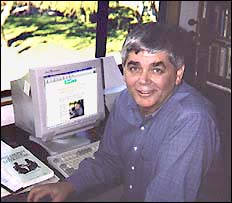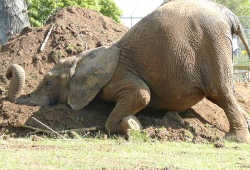Dorothy – 1/8/98
An interview with Denis Dutton – outspoken advocate for high quality public broadcasting. If you haven’t already, you may want to read Part 1 in this series on Public Broadcasting.
|
|
| Denis Dutton |
In Part 1 when discussing the work of the New Zealand Friends of Public Broadcasting I referred to the strong impetus given to its formation by Denis Dutton.
Denis came to New Zealand from the USA and stayed to teach at the University of Canterbury. For many his name has become synonymous with fearless public comment on many issues of public concern, especially broadcasting, education, and art.
Long involvement with radio His first involvement with radio was when he was at university in the USA where he worked in non-commercial radio, and even after he became a philosophy professor at the University of Michigan he continued as a radio announcer in Detroit. He worked for a commercial station, WQRS, which is a commercial classical station. He has always been an assiduous listener to radio.
Appointment as a director of Radio New Zealand In late 1995 Denis was appointed by the government as a director of Radio New Zealand because of his interest in radio and his concern about it. Maybe this appointment aimed to use the energy which Denis was putting into criticising radio to benefit the medium!
“Television a degraded medium” He is still as outspoken as ever and although he defends public radio he is highly critical of television. In his view it truly is a degraded medium. It is doing the country no good to have television
“…awash with banal
tinsel – trivialised news and so-called current affairs every night. We need a television that expands people’s imaginations and gives them a good awareness of what is really going on in the rest of the world if we are to maintain our position as one of the developed members of the OECD.”
Some days he thinks we are in danger of slipping back into some third world status economically and intellectually. It is really intellectual capital that all countries rely on these days. The US is the most powerful country in the world, but because of human resources, not natural resources. If we are not developing ours through education and through adequate media we will slip back accordingly.
Public radio benefiting from the commercialism of its competitors Recent strong ratings for national radio in all of the major markets show that public radio is doing well in most people’s estimations. Denis believes that this is partly because of a flight from the triviality of the other media.
“The worse television and commercial radio become the more people feel that they simply have to listen to National Radio or Concert FM to receive any kind of stimulation. The commercial media in New Zealand have systematically underestimated the intelligence of their audience. They seem to be trying to outdo each other in going as far down market as possible. A dumbed down country gets the programmes it deserves.”
Wellington-centred broadcasting Increased centralisation has cut the number of locally produced programmes from outside Wellington. Radio New Zealand transmits programmes from Radio New Zealand House which is on The Terrace in Wellington. Most of the staff are there, but there are three news staff based in Christchurch and a music producer and nine other staff in Auckland. News of the provinces comes from reporters scattered around the country.
This leads to an emphasis, some would say over-emphasis, on national politics. There is not the total coverage of the country that we had in the past. The notion that Radio New Zealand is out there and in every corner of the country is no longer the case. It relies more on fewer reporters in the regions and a lot more phoning out from the Wellington news room.
Listeners favour in-depth interviewing National Radio does very well in the ratings on Saturday and Sunday mornings and on weekday mornings during the time of Morning Report – surely an indication that there is great public interest in in-depth interviews.
Funding There has been a steady erosion of the funding of public radio out of the broadcasting fee. Until recently it stood at $19,400,000 per year from New Zealand on Air. After a recent ministerial review Radio New Zealand was granted a funding increase of $2,000,000.
Expensive move to new premises has brought some advantages. Because of the demolition of Broadcasting House to build the proposed ‘Parliamentary Palace’ (which has now been cancelled) Radio New Zealand had to move further up the street. That move required a lot of funds, time and effort, which would otherwise have been put into needed restructuring. That expensive and time-consuming exercise has kept Radio New Zealand from going forward with plans to add efficiencies to the business. That is the down side of the change. However, the new quarters are actually in many respects better than the old facilities at Broadcasting House, in particular the news room.
Concert FM, instead of being in a separate building, is now integrated with the operations of National Radio, and the staff have more personal contact – a positive development.
The move was extremely complex and it had to be achieved without a single break in the programmes. This, in Denis’s view, was magnificently done and those who listened to Morning Report that morning would never have known the difference – not a hiccough.
Loss of revenue Since the late eighties the funding of National Radio has been reduced some 80%. Radio New Zealand envisaged economising and selling news. Unfortunately in the last three years the sale of the commercial stations has reduced the market for news. This has meant an unavoidable loss to Radio New Zealand.
Future development expensive Loss of revenue, the cost of the move and the need to modernise are all key factors in the economic situation, as well as the need to go into digital production of programmes which is expensive. It will result in a more efficient company, but the cost of the change is high.
It is very important that Radio New Zealand go on FM, which means getting on FM transmitters and FM dial in the major centres. Many young people never leave the FM dial. Some car radios have FM only. The move will not be able to be made until 2000. All the frequencies are being used by other stations at present and it is not until part of the FM band which is at present used for truck and other civil communication is cleared that RNZ can move in. The FM band does not go as high in New Zealand for non-commercial radio use as it does in the US. For RNZ there will be some expense but not a huge sum.
Radio and television compete for funding from the Broadcasting Fee. The issue is that of the $89,000,000 of the Broadcasting Fee only $21,400,000 goes to Radio New Zealand. A large part of it goes to subsidising ‘junky commercial television programmes’. Radio NZ in terms of cost per listener per hour is as much as 10% or even 5% of the cost of television programmes. Are the quality and the benefit to New Zealanders of the expensive television programmes worth the extra cost?
The government owns two television stations and makes millions of dollars from them, making and presenting programmes which are subsidised from New Zealand on Air. Some of this profit ought to be made available to Radio New Zealand to improve its product.
Commercialism in newspapers and on radio and television Why is there no call world wide for publicly funded non-commercial newspapers? The Americans, the British, the Canadians, the Australians and the European countries insist on having publicly funded television and radio, yet there is never a call for public newspapers.
Denis believes that the difference is that newspapers are a medium of space where readers can select what they read and what they ignore, whereas radio and television are media dominated by time. They are what they are broadcasting at any given moment. Every minute of commercial time is that time taken away from broadcast time. A newspaper can add advertising by adding extra pages. The Sunday New York Times weighs four kilos. The reader selects what is wanted.
Public radio is nothing but a series of programmes put on for the sake of listeners. Unlike commercial radio and television it is not a series of advertisements put on with programmes in between to keep them listening to the advertisements.
Commercial radio and public radio are not the same thing. They are different animals – one existing the sake of advertisers, the other for the sake of listeners.
In a comparison between radio and television for Denis radio wins by far. Television turns people into passive consumers. Public radio ratings have held their own well in recent years because people can listen to the radio, receiving intellectual stimulation and information while doing other things. These attest to the power of the medium itself.
So radio has not been killed as a medium by television. In fact there has been a resurgence of interest in radio in the US and in New Zealand. It is an intellectual, thoughtful medium which can engage the mind as television doesn’t. For television what is on the news is determined by the availability of pictures. Radio has no such limits.
“Radio is a great medium, much more a thinking medium than the visual media of television and film. With radio the action actually goes on in your mind. Some people say they prefer radio to television because the pictures are better.”





